Media's Influence: Russian Disinformation & Government Decisions
VerifiedAdded on 2022/11/19
|7
|1830
|136
Essay
AI Summary
This essay investigates the impact of media commentators and Russian disinformation on government decision-making processes, particularly within the context of hybrid warfare. It explores how media outlets, especially those in Russia, employ disinformation tactics to influence public opinion, sow social division, and shape political discourse. The analysis examines the media's role in institutional change, highlighting how it can both reinforce and rapidly alter existing structures. The essay provides examples of Russian disinformation campaigns in various regions, including the Baltics and Syria, demonstrating the use of online trolling, automated accounts, and the exploitation of cognitive biases to manipulate public perception and influence government actions. It concludes by emphasizing the need for fair and unbiased information dissemination to prevent authoritarian propaganda and protect democratic processes, underscoring the significant influence media commentators have on governmental decisions worldwide.
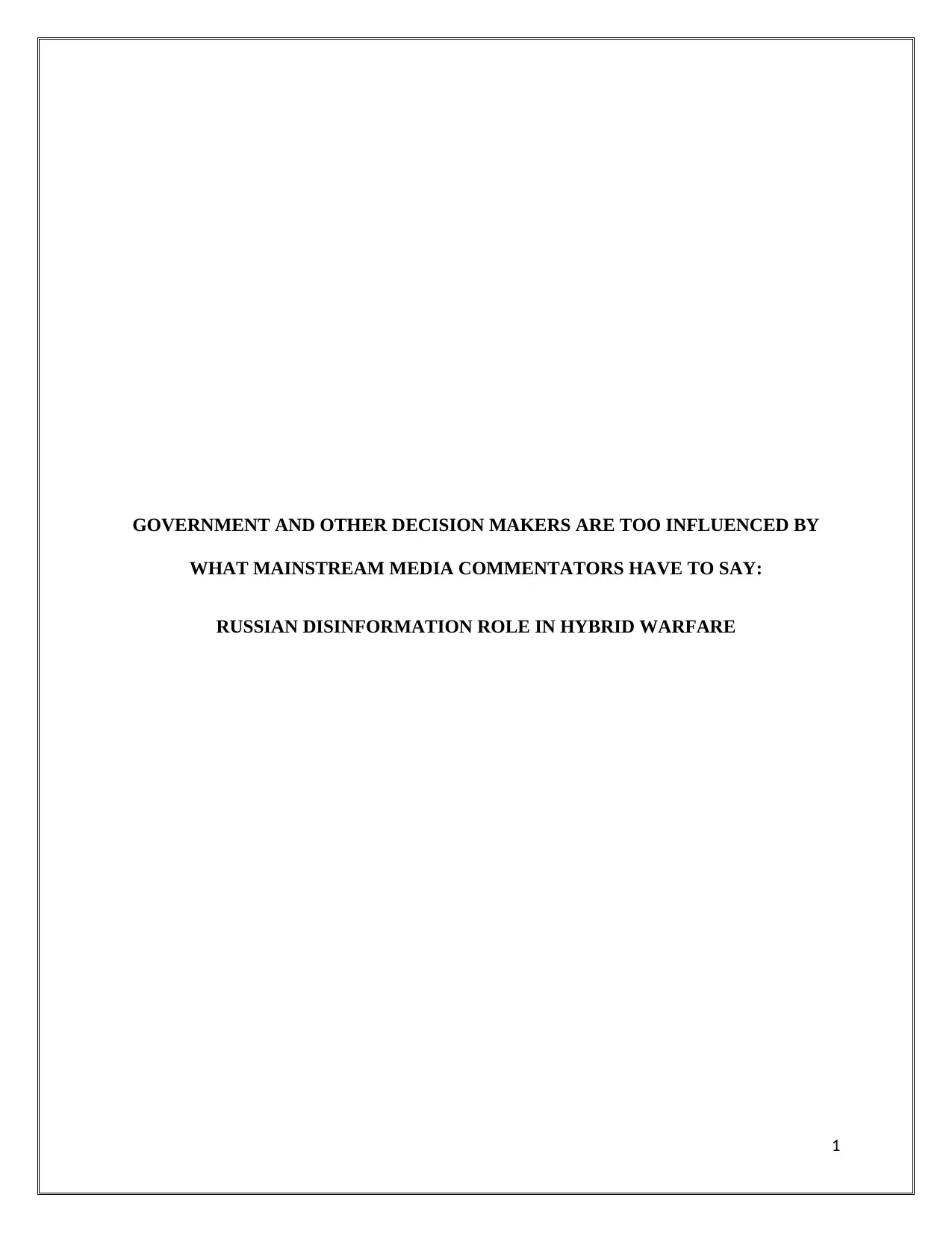
GOVERNMENT AND OTHER DECISION MAKERS ARE TOO INFLUENCED BY
WHAT MAINSTREAM MEDIA COMMENTATORS HAVE TO SAY:
RUSSIAN DISINFORMATION ROLE IN HYBRID WARFARE
1
WHAT MAINSTREAM MEDIA COMMENTATORS HAVE TO SAY:
RUSSIAN DISINFORMATION ROLE IN HYBRID WARFARE
1
Paraphrase This Document
Need a fresh take? Get an instant paraphrase of this document with our AI Paraphraser
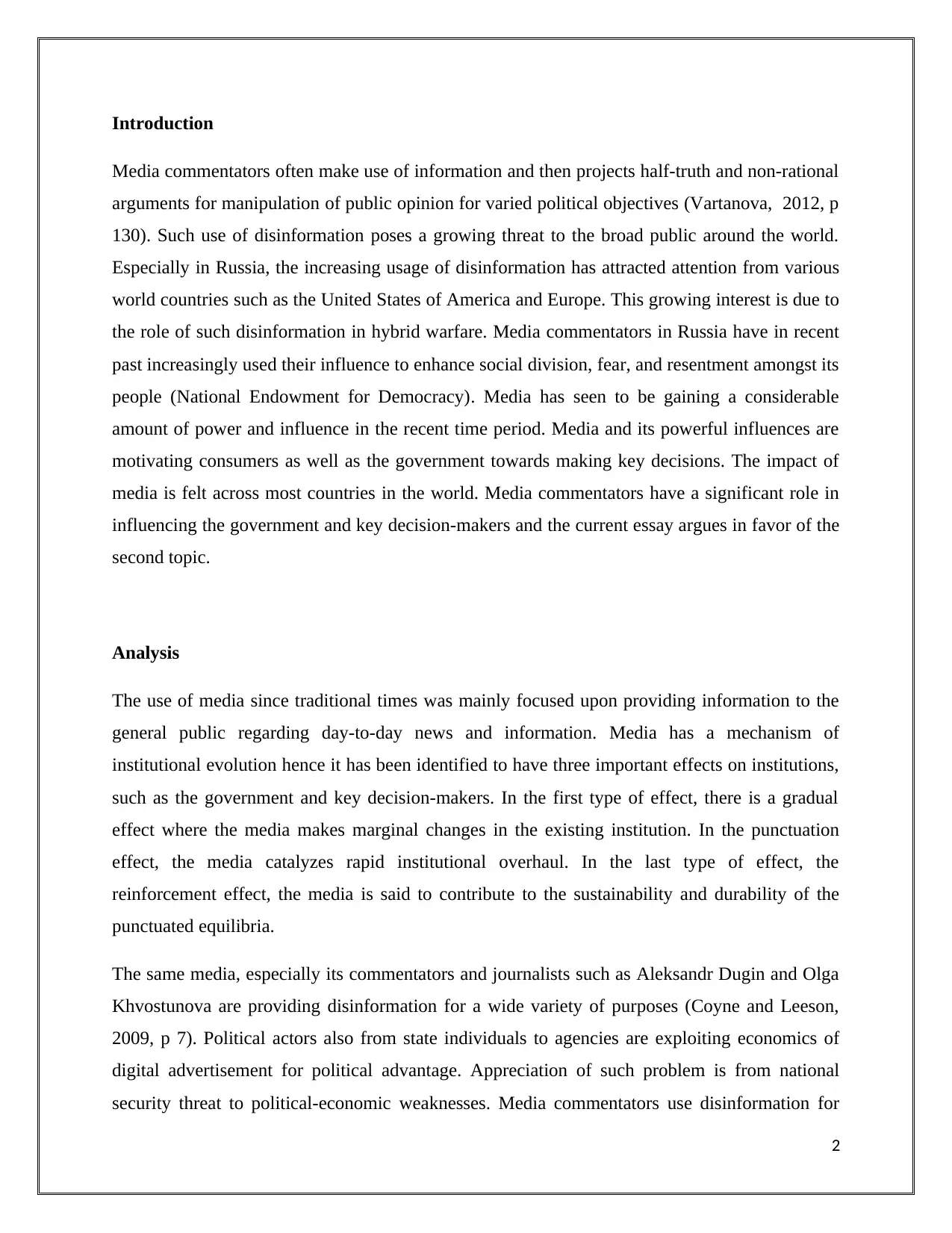
Introduction
Media commentators often make use of information and then projects half-truth and non-rational
arguments for manipulation of public opinion for varied political objectives (Vartanova, 2012, p
130). Such use of disinformation poses a growing threat to the broad public around the world.
Especially in Russia, the increasing usage of disinformation has attracted attention from various
world countries such as the United States of America and Europe. This growing interest is due to
the role of such disinformation in hybrid warfare. Media commentators in Russia have in recent
past increasingly used their influence to enhance social division, fear, and resentment amongst its
people (National Endowment for Democracy). Media has seen to be gaining a considerable
amount of power and influence in the recent time period. Media and its powerful influences are
motivating consumers as well as the government towards making key decisions. The impact of
media is felt across most countries in the world. Media commentators have a significant role in
influencing the government and key decision-makers and the current essay argues in favor of the
second topic.
Analysis
The use of media since traditional times was mainly focused upon providing information to the
general public regarding day-to-day news and information. Media has a mechanism of
institutional evolution hence it has been identified to have three important effects on institutions,
such as the government and key decision-makers. In the first type of effect, there is a gradual
effect where the media makes marginal changes in the existing institution. In the punctuation
effect, the media catalyzes rapid institutional overhaul. In the last type of effect, the
reinforcement effect, the media is said to contribute to the sustainability and durability of the
punctuated equilibria.
The same media, especially its commentators and journalists such as Aleksandr Dugin and Olga
Khvostunova are providing disinformation for a wide variety of purposes (Coyne and Leeson,
2009, p 7). Political actors also from state individuals to agencies are exploiting economics of
digital advertisement for political advantage. Appreciation of such problem is from national
security threat to political-economic weaknesses. Media commentators use disinformation for
2
Media commentators often make use of information and then projects half-truth and non-rational
arguments for manipulation of public opinion for varied political objectives (Vartanova, 2012, p
130). Such use of disinformation poses a growing threat to the broad public around the world.
Especially in Russia, the increasing usage of disinformation has attracted attention from various
world countries such as the United States of America and Europe. This growing interest is due to
the role of such disinformation in hybrid warfare. Media commentators in Russia have in recent
past increasingly used their influence to enhance social division, fear, and resentment amongst its
people (National Endowment for Democracy). Media has seen to be gaining a considerable
amount of power and influence in the recent time period. Media and its powerful influences are
motivating consumers as well as the government towards making key decisions. The impact of
media is felt across most countries in the world. Media commentators have a significant role in
influencing the government and key decision-makers and the current essay argues in favor of the
second topic.
Analysis
The use of media since traditional times was mainly focused upon providing information to the
general public regarding day-to-day news and information. Media has a mechanism of
institutional evolution hence it has been identified to have three important effects on institutions,
such as the government and key decision-makers. In the first type of effect, there is a gradual
effect where the media makes marginal changes in the existing institution. In the punctuation
effect, the media catalyzes rapid institutional overhaul. In the last type of effect, the
reinforcement effect, the media is said to contribute to the sustainability and durability of the
punctuated equilibria.
The same media, especially its commentators and journalists such as Aleksandr Dugin and Olga
Khvostunova are providing disinformation for a wide variety of purposes (Coyne and Leeson,
2009, p 7). Political actors also from state individuals to agencies are exploiting economics of
digital advertisement for political advantage. Appreciation of such problem is from national
security threat to political-economic weaknesses. Media commentators use disinformation for
2
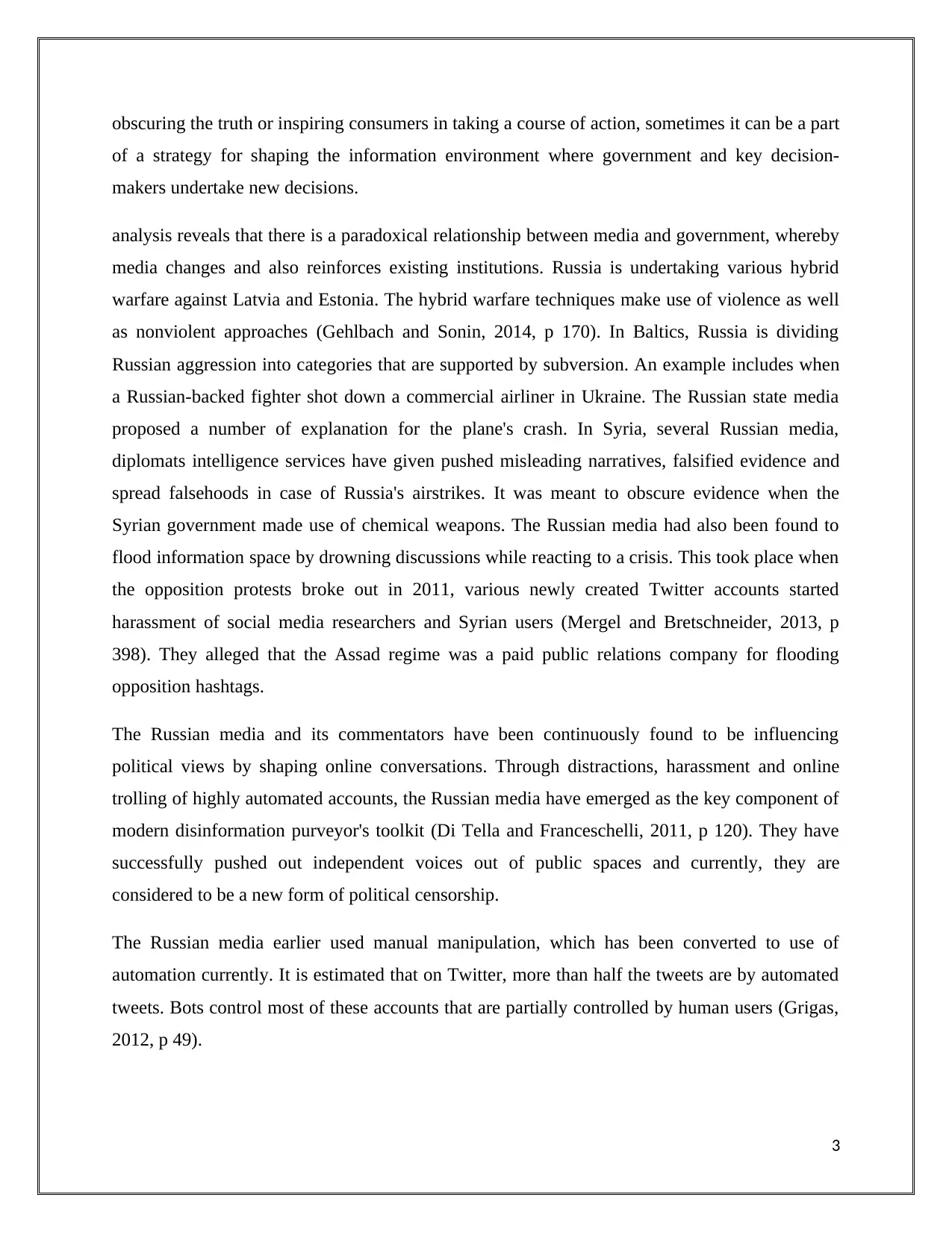
obscuring the truth or inspiring consumers in taking a course of action, sometimes it can be a part
of a strategy for shaping the information environment where government and key decision-
makers undertake new decisions.
analysis reveals that there is a paradoxical relationship between media and government, whereby
media changes and also reinforces existing institutions. Russia is undertaking various hybrid
warfare against Latvia and Estonia. The hybrid warfare techniques make use of violence as well
as nonviolent approaches (Gehlbach and Sonin, 2014, p 170). In Baltics, Russia is dividing
Russian aggression into categories that are supported by subversion. An example includes when
a Russian-backed fighter shot down a commercial airliner in Ukraine. The Russian state media
proposed a number of explanation for the plane's crash. In Syria, several Russian media,
diplomats intelligence services have given pushed misleading narratives, falsified evidence and
spread falsehoods in case of Russia's airstrikes. It was meant to obscure evidence when the
Syrian government made use of chemical weapons. The Russian media had also been found to
flood information space by drowning discussions while reacting to a crisis. This took place when
the opposition protests broke out in 2011, various newly created Twitter accounts started
harassment of social media researchers and Syrian users (Mergel and Bretschneider, 2013, p
398). They alleged that the Assad regime was a paid public relations company for flooding
opposition hashtags.
The Russian media and its commentators have been continuously found to be influencing
political views by shaping online conversations. Through distractions, harassment and online
trolling of highly automated accounts, the Russian media have emerged as the key component of
modern disinformation purveyor's toolkit (Di Tella and Franceschelli, 2011, p 120). They have
successfully pushed out independent voices out of public spaces and currently, they are
considered to be a new form of political censorship.
The Russian media earlier used manual manipulation, which has been converted to use of
automation currently. It is estimated that on Twitter, more than half the tweets are by automated
tweets. Bots control most of these accounts that are partially controlled by human users (Grigas,
2012, p 49).
3
of a strategy for shaping the information environment where government and key decision-
makers undertake new decisions.
analysis reveals that there is a paradoxical relationship between media and government, whereby
media changes and also reinforces existing institutions. Russia is undertaking various hybrid
warfare against Latvia and Estonia. The hybrid warfare techniques make use of violence as well
as nonviolent approaches (Gehlbach and Sonin, 2014, p 170). In Baltics, Russia is dividing
Russian aggression into categories that are supported by subversion. An example includes when
a Russian-backed fighter shot down a commercial airliner in Ukraine. The Russian state media
proposed a number of explanation for the plane's crash. In Syria, several Russian media,
diplomats intelligence services have given pushed misleading narratives, falsified evidence and
spread falsehoods in case of Russia's airstrikes. It was meant to obscure evidence when the
Syrian government made use of chemical weapons. The Russian media had also been found to
flood information space by drowning discussions while reacting to a crisis. This took place when
the opposition protests broke out in 2011, various newly created Twitter accounts started
harassment of social media researchers and Syrian users (Mergel and Bretschneider, 2013, p
398). They alleged that the Assad regime was a paid public relations company for flooding
opposition hashtags.
The Russian media and its commentators have been continuously found to be influencing
political views by shaping online conversations. Through distractions, harassment and online
trolling of highly automated accounts, the Russian media have emerged as the key component of
modern disinformation purveyor's toolkit (Di Tella and Franceschelli, 2011, p 120). They have
successfully pushed out independent voices out of public spaces and currently, they are
considered to be a new form of political censorship.
The Russian media earlier used manual manipulation, which has been converted to use of
automation currently. It is estimated that on Twitter, more than half the tweets are by automated
tweets. Bots control most of these accounts that are partially controlled by human users (Grigas,
2012, p 49).
3
⊘ This is a preview!⊘
Do you want full access?
Subscribe today to unlock all pages.

Trusted by 1+ million students worldwide
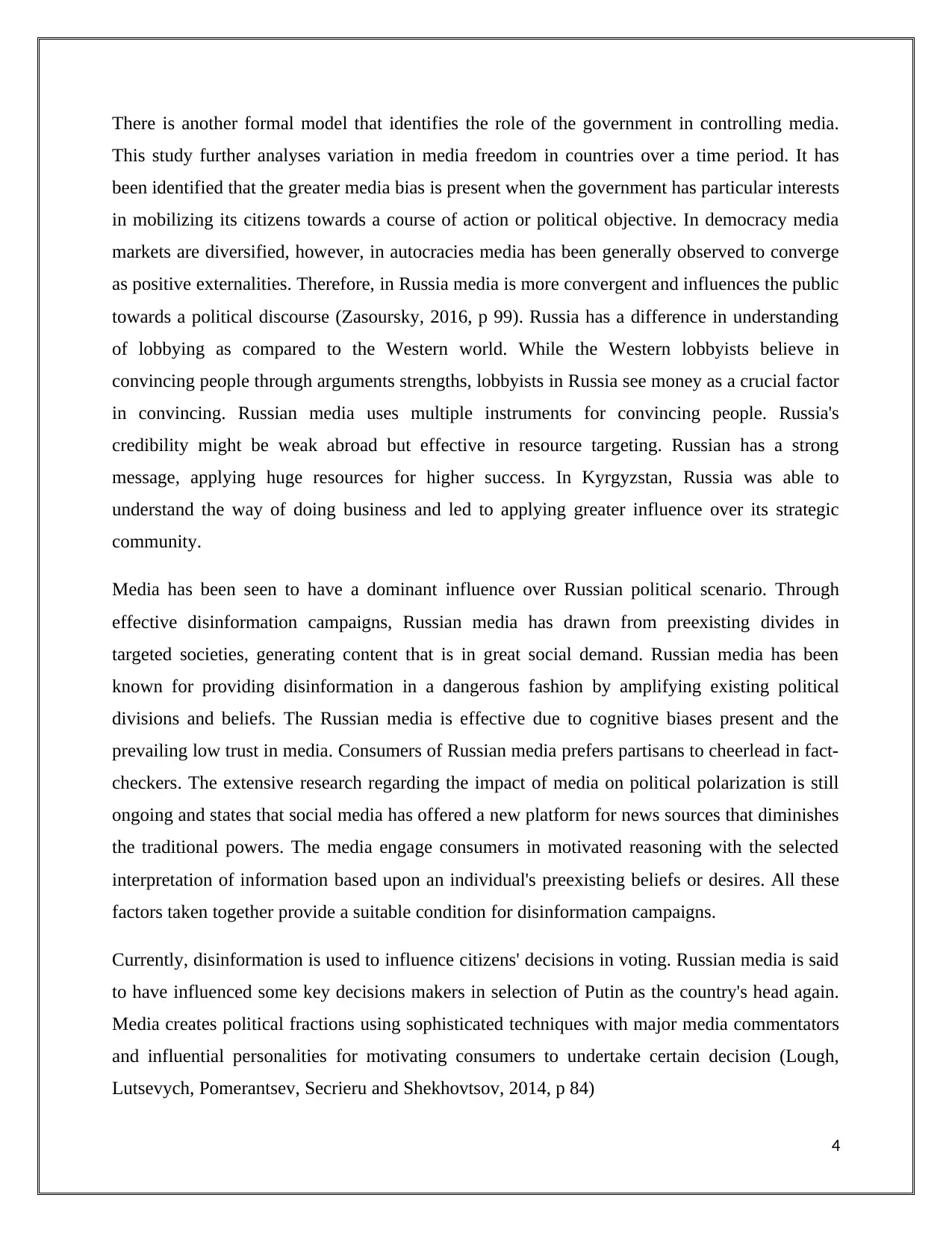
There is another formal model that identifies the role of the government in controlling media.
This study further analyses variation in media freedom in countries over a time period. It has
been identified that the greater media bias is present when the government has particular interests
in mobilizing its citizens towards a course of action or political objective. In democracy media
markets are diversified, however, in autocracies media has been generally observed to converge
as positive externalities. Therefore, in Russia media is more convergent and influences the public
towards a political discourse (Zasoursky, 2016, p 99). Russia has a difference in understanding
of lobbying as compared to the Western world. While the Western lobbyists believe in
convincing people through arguments strengths, lobbyists in Russia see money as a crucial factor
in convincing. Russian media uses multiple instruments for convincing people. Russia's
credibility might be weak abroad but effective in resource targeting. Russian has a strong
message, applying huge resources for higher success. In Kyrgyzstan, Russia was able to
understand the way of doing business and led to applying greater influence over its strategic
community.
Media has been seen to have a dominant influence over Russian political scenario. Through
effective disinformation campaigns, Russian media has drawn from preexisting divides in
targeted societies, generating content that is in great social demand. Russian media has been
known for providing disinformation in a dangerous fashion by amplifying existing political
divisions and beliefs. The Russian media is effective due to cognitive biases present and the
prevailing low trust in media. Consumers of Russian media prefers partisans to cheerlead in fact-
checkers. The extensive research regarding the impact of media on political polarization is still
ongoing and states that social media has offered a new platform for news sources that diminishes
the traditional powers. The media engage consumers in motivated reasoning with the selected
interpretation of information based upon an individual's preexisting beliefs or desires. All these
factors taken together provide a suitable condition for disinformation campaigns.
Currently, disinformation is used to influence citizens' decisions in voting. Russian media is said
to have influenced some key decisions makers in selection of Putin as the country's head again.
Media creates political fractions using sophisticated techniques with major media commentators
and influential personalities for motivating consumers to undertake certain decision (Lough,
Lutsevych, Pomerantsev, Secrieru and Shekhovtsov, 2014, p 84)
4
This study further analyses variation in media freedom in countries over a time period. It has
been identified that the greater media bias is present when the government has particular interests
in mobilizing its citizens towards a course of action or political objective. In democracy media
markets are diversified, however, in autocracies media has been generally observed to converge
as positive externalities. Therefore, in Russia media is more convergent and influences the public
towards a political discourse (Zasoursky, 2016, p 99). Russia has a difference in understanding
of lobbying as compared to the Western world. While the Western lobbyists believe in
convincing people through arguments strengths, lobbyists in Russia see money as a crucial factor
in convincing. Russian media uses multiple instruments for convincing people. Russia's
credibility might be weak abroad but effective in resource targeting. Russian has a strong
message, applying huge resources for higher success. In Kyrgyzstan, Russia was able to
understand the way of doing business and led to applying greater influence over its strategic
community.
Media has been seen to have a dominant influence over Russian political scenario. Through
effective disinformation campaigns, Russian media has drawn from preexisting divides in
targeted societies, generating content that is in great social demand. Russian media has been
known for providing disinformation in a dangerous fashion by amplifying existing political
divisions and beliefs. The Russian media is effective due to cognitive biases present and the
prevailing low trust in media. Consumers of Russian media prefers partisans to cheerlead in fact-
checkers. The extensive research regarding the impact of media on political polarization is still
ongoing and states that social media has offered a new platform for news sources that diminishes
the traditional powers. The media engage consumers in motivated reasoning with the selected
interpretation of information based upon an individual's preexisting beliefs or desires. All these
factors taken together provide a suitable condition for disinformation campaigns.
Currently, disinformation is used to influence citizens' decisions in voting. Russian media is said
to have influenced some key decisions makers in selection of Putin as the country's head again.
Media creates political fractions using sophisticated techniques with major media commentators
and influential personalities for motivating consumers to undertake certain decision (Lough,
Lutsevych, Pomerantsev, Secrieru and Shekhovtsov, 2014, p 84)
4
Paraphrase This Document
Need a fresh take? Get an instant paraphrase of this document with our AI Paraphraser
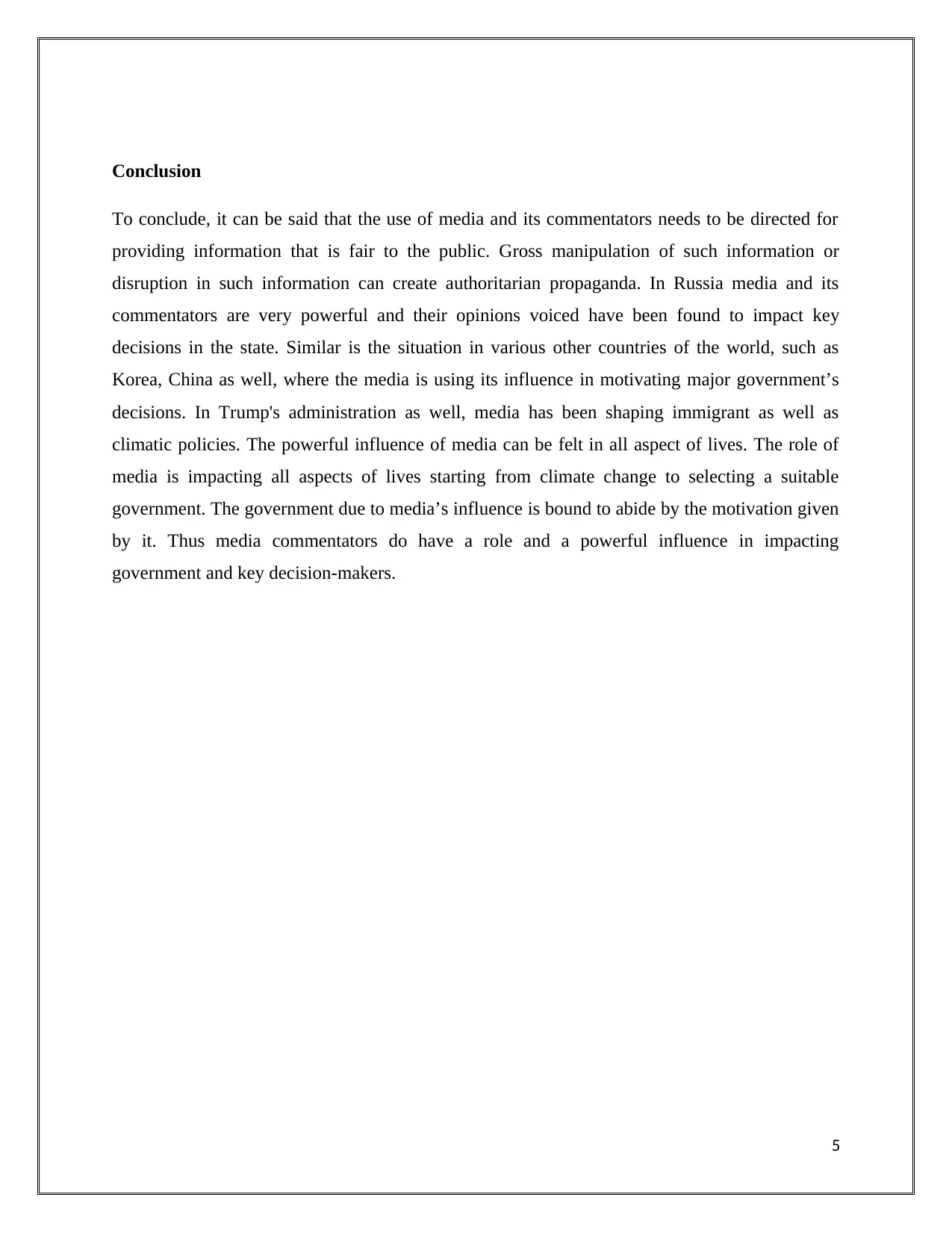
Conclusion
To conclude, it can be said that the use of media and its commentators needs to be directed for
providing information that is fair to the public. Gross manipulation of such information or
disruption in such information can create authoritarian propaganda. In Russia media and its
commentators are very powerful and their opinions voiced have been found to impact key
decisions in the state. Similar is the situation in various other countries of the world, such as
Korea, China as well, where the media is using its influence in motivating major government’s
decisions. In Trump's administration as well, media has been shaping immigrant as well as
climatic policies. The powerful influence of media can be felt in all aspect of lives. The role of
media is impacting all aspects of lives starting from climate change to selecting a suitable
government. The government due to media’s influence is bound to abide by the motivation given
by it. Thus media commentators do have a role and a powerful influence in impacting
government and key decision-makers.
5
To conclude, it can be said that the use of media and its commentators needs to be directed for
providing information that is fair to the public. Gross manipulation of such information or
disruption in such information can create authoritarian propaganda. In Russia media and its
commentators are very powerful and their opinions voiced have been found to impact key
decisions in the state. Similar is the situation in various other countries of the world, such as
Korea, China as well, where the media is using its influence in motivating major government’s
decisions. In Trump's administration as well, media has been shaping immigrant as well as
climatic policies. The powerful influence of media can be felt in all aspect of lives. The role of
media is impacting all aspects of lives starting from climate change to selecting a suitable
government. The government due to media’s influence is bound to abide by the motivation given
by it. Thus media commentators do have a role and a powerful influence in impacting
government and key decision-makers.
5
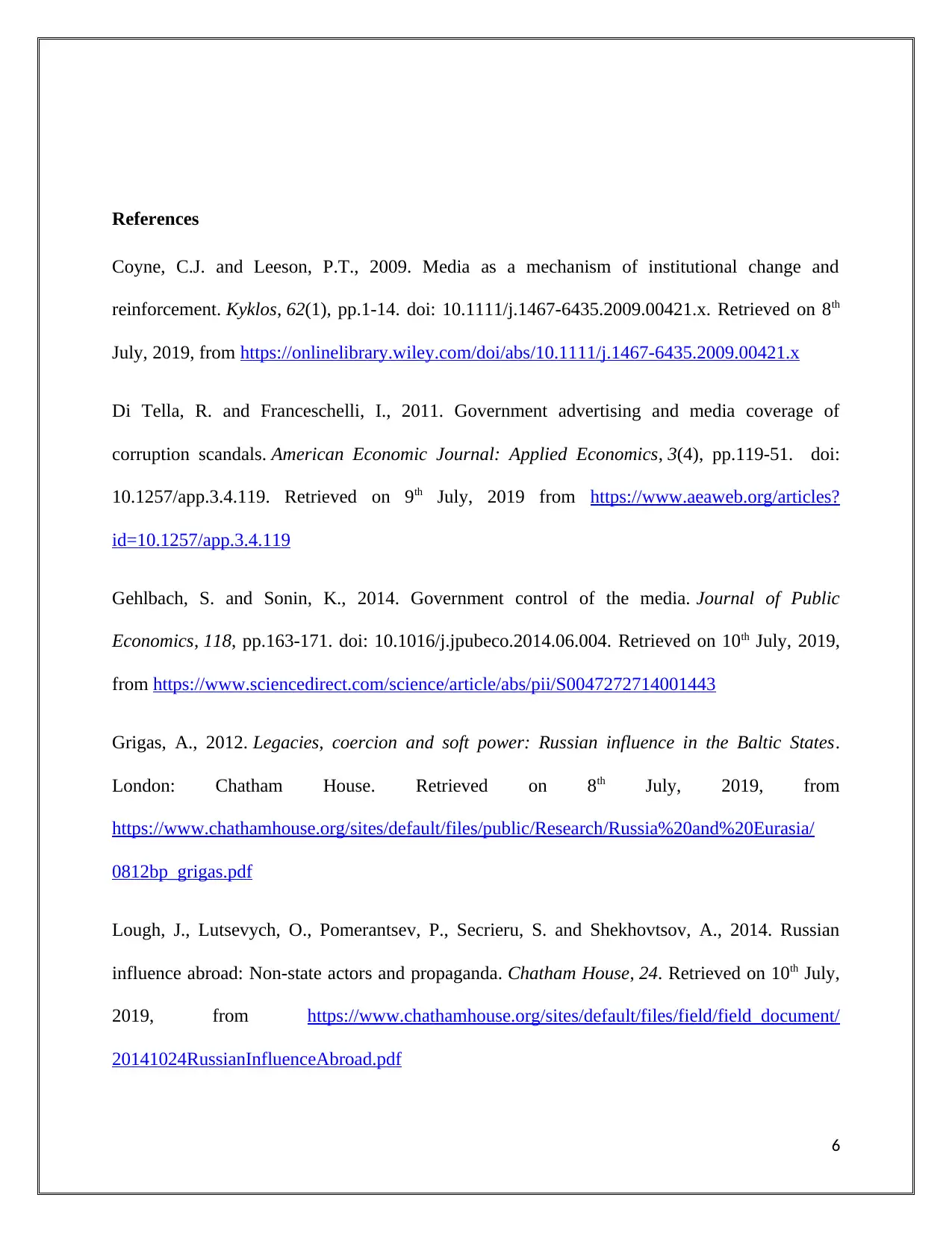
References
Coyne, C.J. and Leeson, P.T., 2009. Media as a mechanism of institutional change and
reinforcement. Kyklos, 62(1), pp.1-14. doi: 10.1111/j.1467-6435.2009.00421.x. Retrieved on 8th
July, 2019, from https://onlinelibrary.wiley.com/doi/abs/10.1111/j.1467-6435.2009.00421.x
Di Tella, R. and Franceschelli, I., 2011. Government advertising and media coverage of
corruption scandals. American Economic Journal: Applied Economics, 3(4), pp.119-51. doi:
10.1257/app.3.4.119. Retrieved on 9th July, 2019 from https://www.aeaweb.org/articles?
id=10.1257/app.3.4.119
Gehlbach, S. and Sonin, K., 2014. Government control of the media. Journal of Public
Economics, 118, pp.163-171. doi: 10.1016/j.jpubeco.2014.06.004. Retrieved on 10th July, 2019,
from https://www.sciencedirect.com/science/article/abs/pii/S0047272714001443
Grigas, A., 2012. Legacies, coercion and soft power: Russian influence in the Baltic States.
London: Chatham House. Retrieved on 8th July, 2019, from
https://www.chathamhouse.org/sites/default/files/public/Research/Russia%20and%20Eurasia/
0812bp_grigas.pdf
Lough, J., Lutsevych, O., Pomerantsev, P., Secrieru, S. and Shekhovtsov, A., 2014. Russian
influence abroad: Non-state actors and propaganda. Chatham House, 24. Retrieved on 10th July,
2019, from https://www.chathamhouse.org/sites/default/files/field/field_document/
20141024RussianInfluenceAbroad.pdf
6
Coyne, C.J. and Leeson, P.T., 2009. Media as a mechanism of institutional change and
reinforcement. Kyklos, 62(1), pp.1-14. doi: 10.1111/j.1467-6435.2009.00421.x. Retrieved on 8th
July, 2019, from https://onlinelibrary.wiley.com/doi/abs/10.1111/j.1467-6435.2009.00421.x
Di Tella, R. and Franceschelli, I., 2011. Government advertising and media coverage of
corruption scandals. American Economic Journal: Applied Economics, 3(4), pp.119-51. doi:
10.1257/app.3.4.119. Retrieved on 9th July, 2019 from https://www.aeaweb.org/articles?
id=10.1257/app.3.4.119
Gehlbach, S. and Sonin, K., 2014. Government control of the media. Journal of Public
Economics, 118, pp.163-171. doi: 10.1016/j.jpubeco.2014.06.004. Retrieved on 10th July, 2019,
from https://www.sciencedirect.com/science/article/abs/pii/S0047272714001443
Grigas, A., 2012. Legacies, coercion and soft power: Russian influence in the Baltic States.
London: Chatham House. Retrieved on 8th July, 2019, from
https://www.chathamhouse.org/sites/default/files/public/Research/Russia%20and%20Eurasia/
0812bp_grigas.pdf
Lough, J., Lutsevych, O., Pomerantsev, P., Secrieru, S. and Shekhovtsov, A., 2014. Russian
influence abroad: Non-state actors and propaganda. Chatham House, 24. Retrieved on 10th July,
2019, from https://www.chathamhouse.org/sites/default/files/field/field_document/
20141024RussianInfluenceAbroad.pdf
6
⊘ This is a preview!⊘
Do you want full access?
Subscribe today to unlock all pages.

Trusted by 1+ million students worldwide
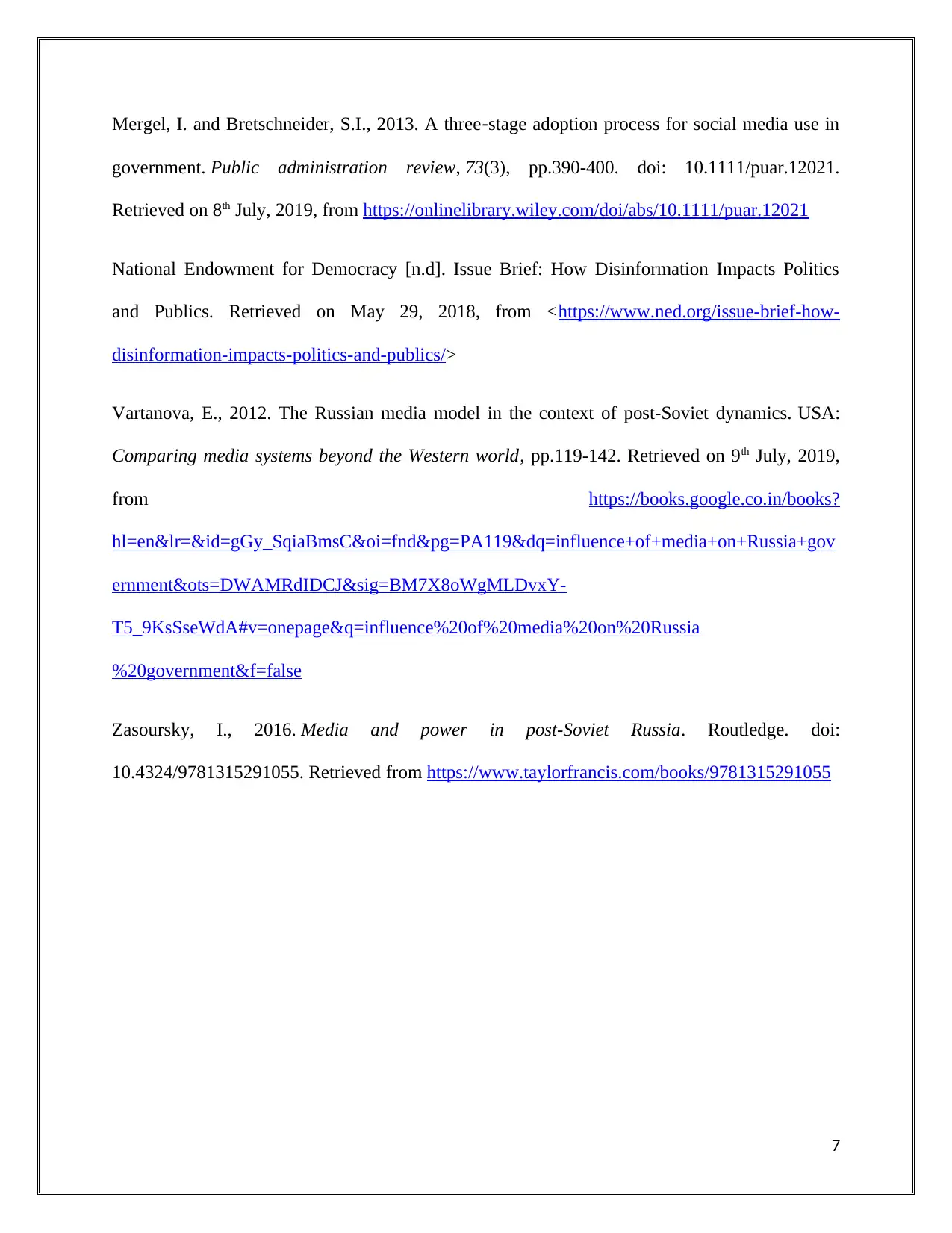
Mergel, I. and Bretschneider, S.I., 2013. A three‐stage adoption process for social media use in
government. Public administration review, 73(3), pp.390-400. doi: 10.1111/puar.12021.
Retrieved on 8th July, 2019, from https://onlinelibrary.wiley.com/doi/abs/10.1111/puar.12021
National Endowment for Democracy [n.d]. Issue Brief: How Disinformation Impacts Politics
and Publics. Retrieved on May 29, 2018, from <https://www.ned.org/issue-brief-how-
disinformation-impacts-politics-and-publics/>
Vartanova, E., 2012. The Russian media model in the context of post-Soviet dynamics. USA:
Comparing media systems beyond the Western world, pp.119-142. Retrieved on 9th July, 2019,
from https://books.google.co.in/books?
hl=en&lr=&id=gGy_SqiaBmsC&oi=fnd&pg=PA119&dq=influence+of+media+on+Russia+gov
ernment&ots=DWAMRdIDCJ&sig=BM7X8oWgMLDvxY-
T5_9KsSseWdA#v=onepage&q=influence%20of%20media%20on%20Russia
%20government&f=false
Zasoursky, I., 2016. Media and power in post-Soviet Russia. Routledge. doi:
10.4324/9781315291055. Retrieved from https://www.taylorfrancis.com/books/9781315291055
7
government. Public administration review, 73(3), pp.390-400. doi: 10.1111/puar.12021.
Retrieved on 8th July, 2019, from https://onlinelibrary.wiley.com/doi/abs/10.1111/puar.12021
National Endowment for Democracy [n.d]. Issue Brief: How Disinformation Impacts Politics
and Publics. Retrieved on May 29, 2018, from <https://www.ned.org/issue-brief-how-
disinformation-impacts-politics-and-publics/>
Vartanova, E., 2012. The Russian media model in the context of post-Soviet dynamics. USA:
Comparing media systems beyond the Western world, pp.119-142. Retrieved on 9th July, 2019,
from https://books.google.co.in/books?
hl=en&lr=&id=gGy_SqiaBmsC&oi=fnd&pg=PA119&dq=influence+of+media+on+Russia+gov
ernment&ots=DWAMRdIDCJ&sig=BM7X8oWgMLDvxY-
T5_9KsSseWdA#v=onepage&q=influence%20of%20media%20on%20Russia
%20government&f=false
Zasoursky, I., 2016. Media and power in post-Soviet Russia. Routledge. doi:
10.4324/9781315291055. Retrieved from https://www.taylorfrancis.com/books/9781315291055
7
1 out of 7
Your All-in-One AI-Powered Toolkit for Academic Success.
+13062052269
info@desklib.com
Available 24*7 on WhatsApp / Email
![[object Object]](/_next/static/media/star-bottom.7253800d.svg)
Unlock your academic potential
Copyright © 2020–2025 A2Z Services. All Rights Reserved. Developed and managed by ZUCOL.


